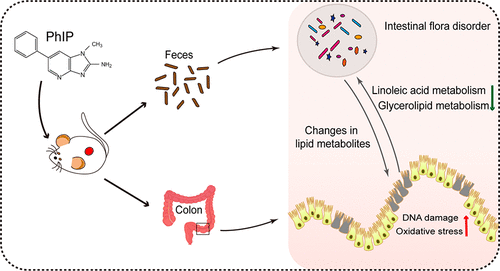当前位置:
X-MOL 学术
›
J. Agric. Food Chem.
›
论文详情
Our official English website, www.x-mol.net, welcomes your
feedback! (Note: you will need to create a separate account there.)
2-Amino-1-methyl-6-phenylimidazo[4,5-b]pyridine Induced Colon Injury by Disrupting the Intestinal Bacterial Composition and Lipid Metabolic Pathways in Rats
Journal of Agricultural and Food Chemistry ( IF 5.7 ) Pub Date : 2020-12-29 , DOI: 10.1021/acs.jafc.0c06588 Xiuli Zhao 1 , Hengchao Liu 1 , Xiaofei Zhou 1 , Xiaoxu Chen 1 , Nan Hu 1 , Yan Zhang 2 , Shuo Wang 2
Journal of Agricultural and Food Chemistry ( IF 5.7 ) Pub Date : 2020-12-29 , DOI: 10.1021/acs.jafc.0c06588 Xiuli Zhao 1 , Hengchao Liu 1 , Xiaofei Zhou 1 , Xiaoxu Chen 1 , Nan Hu 1 , Yan Zhang 2 , Shuo Wang 2
Affiliation

|
2-Amino-1-methyl-6-phenylimidazo[4,5-b]pyridine (PhIP), one of the most abundant heterocyclic amines, is a common carcinogen produced in thermally processed protein-rich foods. Studies have demonstrated that PhIP could induce colon tumors in rodents, leaving mechanisms uncovered. This study aims to investigate the mechanism of PhIP-induced colon injury in a rat model. The results of 16S rRNA gene sequencing and metabolomics showed that PhIP disrupted intestinal bacterial composition and affected the glycerophospholipid metabolism and linoleic acid metabolism. Simultaneously, the lipid metabolism function in the intestinal flora was inhibited by PhIP. Notably, transcriptomics revealed that PhIP remarkably inhibited the expression of gene sets associated with steroid hormone biosynthesis, fatty acid elongation, fatty acid degradation, and glycerolipid metabolism pathways in the colon. The results provide new perspectives to study the mechanism of PhIP-induced colon injury and theoretical bases for further understanding the toxicity of PhIP.
中文翻译:

2-氨基-1-甲基-6-苯基咪唑并[4,5- b ]吡啶通过破坏大鼠肠道细菌组成和脂质代谢途径而引起结肠损伤
2-氨基-1-甲基-6-苯基咪唑[4,5- b]吡啶(PhIP)是最丰富的杂环胺之一,是在富含蛋白质的热加工食品中产生的常见致癌物。研究表明,PhIP可以在啮齿动物中诱发结肠肿瘤,而其机理尚未发现。这项研究旨在探讨PhIP诱导的大鼠结肠损伤的机制。16S rRNA基因测序和代谢组学的结果表明,PhIP会破坏肠道细菌组成,并影响甘油磷脂代谢和亚油酸代谢。同时,PhIP抑制肠道菌群中的脂质代谢功能。值得注意的是,转录组学揭示了PhIP显着抑制了结肠中与类固醇激素生物合成,脂肪酸延伸,脂肪酸降解和甘油脂代谢途径相关的基因集的表达。
更新日期:2021-01-13
中文翻译:

2-氨基-1-甲基-6-苯基咪唑并[4,5- b ]吡啶通过破坏大鼠肠道细菌组成和脂质代谢途径而引起结肠损伤
2-氨基-1-甲基-6-苯基咪唑[4,5- b]吡啶(PhIP)是最丰富的杂环胺之一,是在富含蛋白质的热加工食品中产生的常见致癌物。研究表明,PhIP可以在啮齿动物中诱发结肠肿瘤,而其机理尚未发现。这项研究旨在探讨PhIP诱导的大鼠结肠损伤的机制。16S rRNA基因测序和代谢组学的结果表明,PhIP会破坏肠道细菌组成,并影响甘油磷脂代谢和亚油酸代谢。同时,PhIP抑制肠道菌群中的脂质代谢功能。值得注意的是,转录组学揭示了PhIP显着抑制了结肠中与类固醇激素生物合成,脂肪酸延伸,脂肪酸降解和甘油脂代谢途径相关的基因集的表达。






























 京公网安备 11010802027423号
京公网安备 11010802027423号